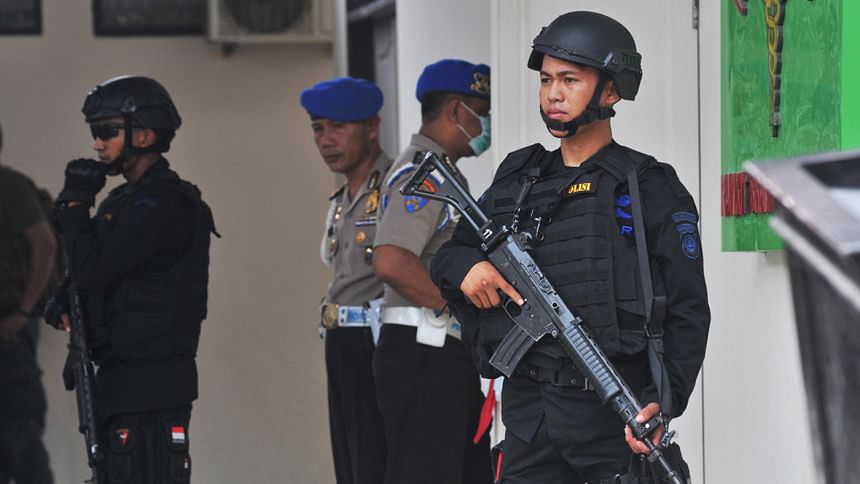Indonesia 'kills most wanted militant'

Indonesian police say they believe they have killed the country's most wanted militant in a jungle gun battle.
The body of Santoso, who led a group that backed so-called Islamic State, had been positively identified, the police chief who led the operation in Central Sulawesi said.
Police are carrying out a DNA test to confirm that the body belongs to the Mujahideen Indonesia Timur leader.
The operation is seen as a major victory for the security forces.
Police, soldiers and journalists let out cries of "praise be to God" at a police press conference announcing the news.
The Islamic State group's influence in Indonesia
Numerous people who had met Santoso or fought alongside him had been asked to identify the body, and confirmed it was him, police said.
Local police chief Rudy Sufahriadi told AFP the person killed was "definitely Santoso", while another police official told Reuters they were "99%" confident it was him.
One other militant was also reported to have been killed.
Santoso pledged allegiance to the Islamic State group in 2014 and had been officially labelled a terrorist by the US government.
His small Mujahideen Indonesia Timur (MIT) group was known for carrying out attacks on security forces, and he urged others to do the same in videos.
MIT is based in Central Sulawesi's mountainous Poso district, a hotbed of religious conflict for over a decade. It is believed to only have about 20 fighters left.
President Joko Widodo last year escalated the search for Santoso, which was already involving thousands of police, by including the military.
National police chief Tito Karnavian said Santoso's death could "demoralise Islamic State supporters in Indonesia", though analysts cast doubt that it would have any impact on the group's support.
Indonesia has the world's largest Muslim population. Most Indonesians practice a moderate form of Islam.
Who is Santoso?
Santoso, also known as "Abu Wardah", has been Indonesia's most highly sought militant but not necessarily its most dangerous.
Indonesian counter terror forces have been actively hunting him since 2013, and have done so with greater urgency following the terror attack in Jakarta in January, as they feared he planned to turn the region into a militant hub.
He was the first Indonesian militant leader to publicly pledge allegiance to IS in 2014, and was active in sectarian violence in Poso between 1998 and 2001.
Santoso is believed to have been training Uighur fighters from China in Poso and had links to other militant groups in the Philippines.
But he was not necessarily the main terror threat to Indonesia. The jailed cleric Aman Abdurrahman and his followers are believed to have been behind the Jakarta attack.
The 5 July suicide bombing in Surakarta, meanwhile, is believed to have been backed by an Indonesian based with IS in the Middle East, Bahrun Naim.

 For all latest news, follow The Daily Star's Google News channel.
For all latest news, follow The Daily Star's Google News channel. 








Comments